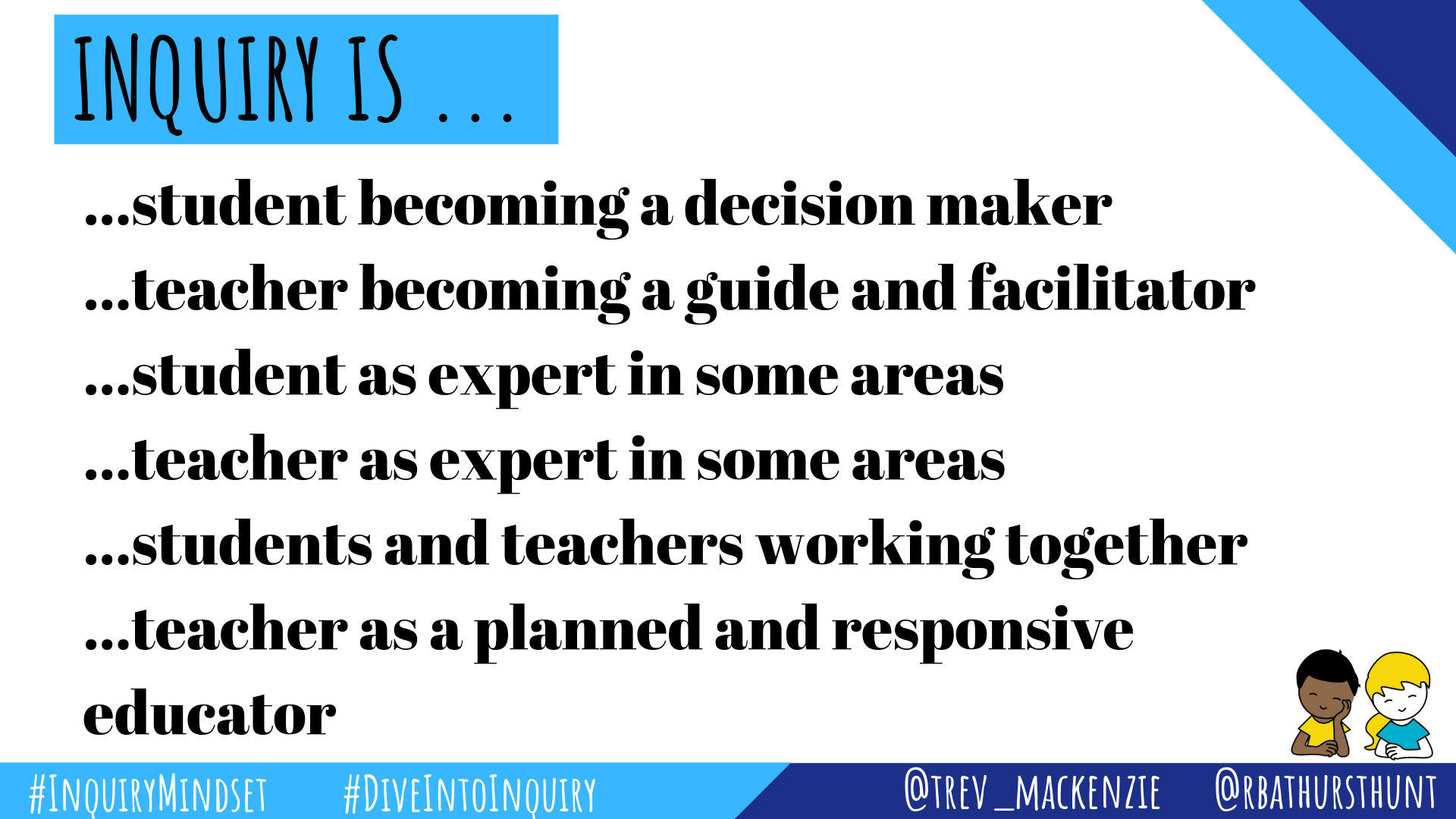I love the power of the pivot. The “pivot” refers to that slightly nuanced move of the responsive educator who, through careful observation and tuning in to the needs of the learners in the room, is able to shift and take on different roles for different students.
Inquiry Myth #9 - Doesn't Prepare Students for the "Real World"
In this series I aim to bust some common myths I often hear in my travels supporting teachers and schools in adopting an Inquiry Mindset for their students. My hope is that we can begin to inform colleagues, parents, and students as to what the reality of inquiry truly is. Please help this movement by sharing these with your PLN.
Here we go with Myth #9!
Inquiry Myth #8 - It Doesn't Belong in Every Classroom
At the high school level inquiry should belong in each subject area. What I mean by this is a Physics inquiry should be innately tied to the conceptual understandings and big ideas of the Physics curriculum. In the same way, a Chemistry inquiry should reflect the conceptual understandings and big ideas of the Chemistry curriculum. Whatever the subject, inquiry reframes what we teach with a focus on how we teach it. It is not a setting dependent pedagogy.
Inquiry Myth #7 - Has a Low Effect Size
In all of my research on inquiry (and yes, I’ve done a lot) I have discovered that there are massive challenges educators face when it comes to implementing inquiry into their practice. When these challenges aren’t met and overcome, yes, inquiry scores a low effect size. But when these challenges are met inquiry transforms into a powerful pedagogy.
Inquiry Myth #6 - Lacking Rigour and Not Challenging
Inquiry Myth #5 - Chocolate Cake for Dinner - AGAIN!!
There is a common misconception that in inquiry students will always explore and even return to topics of little worldly relevance, depth of meaning, or conceptual understanding. I often hear concerns around video games as a topic for young boys and what of relevance or curricular connections can be made to such a topic.
And this is a valid concern. We know how critical literacy and numeracy as building blocks to lifelong learning and predictors of success.
I have several thoughts on the matter but for now I’ll boil it down to one.
Inquiry Myth #4 - Inquiry is a "Hot Mess Express!"
My co-author of Inquiry Mindset, the amazing Rebecca Bathurst-Hunt, always draws a smile to my face when she speaks about inquiry and how, with kindergarten students, it can be a “hot mess express”. I imagine a steam train plunging down a railway with dust and debris bellowing from its windows leaving a wake of destruction in its path. And although this may occur from time to time it is certainly not the norm. Inquiry isn’t messy nor is it out of control. Inquiry teachers strike a balance between letting experiences unfold and mindfully reining things in so it’s not a “hot mess express.”
Inquiry Myth #3 - Without Limits or Parameters
One of the talents of the inquiry teacher is their ability to provide voice and choice while simultaneously teaching to their curriculum and mandated learning objectives. They accomplish this by framing lessons and units of study with access points for all learners. These access points are more than differentiating learning. These access points connect to each students’ wonder and curiosity and provide a start point into learning that is highly relevant. It’s in this relevance that inquiry thrives.
How do you strike a balance between student wonder and your curriculum?
Inquiry Myth #2 - Inquiry is "lazy teaching"
I propose teachers take on an active role in releasing control over learning to the student. Inquiry teachers are highly active in the classroom in that they take on different roles at different times for different reasons. At times they lecture or teach to all. At times they facilitate group and cooperative learning structures. At times they support individual students on a more personalized level as they shift, pivot, and respond to the needs of each student they work with.
Inquiry is not laid back nor is it lazy.
Inquiry Myth #1 - Unlimited Choice for Students
When I speak to “person and purpose” I draw attention to how we consider the students we are working with (and for!) and take into consideration their questions, wonders, interests, goals, and passions. I ask you to consider how you can get to know your students to this extent and how you can connect these highly important details to your curriculum. I propose that our students’ questions, wonders, interests, goals, and passions have deep and authentic ties to our curriculum and perhaps if we all see our curriculum as something with some flex, as something we can reshape a bit, then we’ll have more success supporting our students in inquiry.











